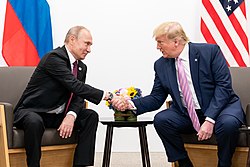| Trump–Russia relations |
|---|
 |
This is a timeline of major events in second half of 2019 related to the investigations into the myriad links between Trump associates and Russian officials that are suspected of being inappropriate, relating to the Russian interference in the 2016 United States elections. It follows the timeline of Russian interference in the 2016 United States elections before and after July 2016 up until election day November 8, and the transition, the first and second halves of 2017, the first and second halves of 2018, and the first half of 2019, but precedes that of 2020 and 2021.
Contents
- January–June 2019
- July–December 2019
- July
- August
- September
- October
- November
- December
- 2020–2021
- See also
- References
- Further reading
- External links
These events are related to, but distinct from, Russian interference in the 2020 United States elections.











